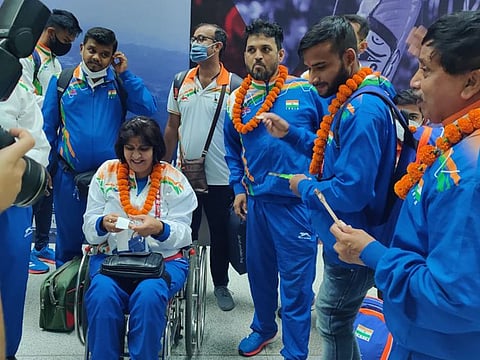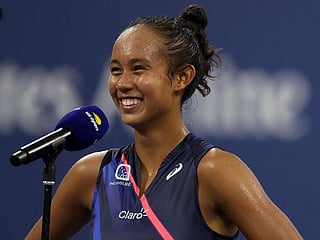Tokyo haul to give Indian paralympians the respect they deserve: Deepa Malik
Rio medallist and President of Indian body gives a peek behind the dream haul

Kolkata: A 19-medal haul by a 54-member Indian contingent at the Tokyo Paralympics had been, by any stretch of imagination, a dream one - though Deepa Malik insists that it did not really come as a surprise to her. The iconic Paralympian, who became the first woman medallist from India in Rio 2016 and is now the President of Paralympic Committee of India (PCI) for the last two years, had predicted 15 medals on the eve of their departure last month.
As the country still basks in the glory of the Paralympians, the last batch of whom retured to the country on Tuesday, Malik insisted that her prediction was based purely on ‘‘realistic assessment’’ rather than any emotional overtones. ‘‘To be honest with you, a figure of 15 was a conservative estimate while our actual expectations were 22. There were a few upsets here and there while one medal was lost post-event when questions were raised about his eligibility etc. All said and done, I would reckon that 19 is a good number,’’ a satisfied Malik said over phone from Tokyo.
The fiesty 50-year-old, a recipient of India’s highest sporting honour (Rajiv Gandhi Khel Ratna) after her shotput silver medal in Rio five years back, took over as President of the Paralympic Committee of India (PCI) in 2019, told Gulf News in an exclusive interview that she feels it was a job ‘well done’ - though the country needs to do a lot more sensitising about the adverse conditions that her breed has to go through in their life and career.
‘‘Tokyo has certainly brought about a great deal of respect for our medalwinners, but a lot remains to be done. You see, Paralympics is way above sport - it’s a lifestyle. It helps in making the society inclusive and in turn makes the country a better place,’’ said Malik, who moves around the world in a wheelchair after being paralysed from waist downwards following multiple surgeries for a tumour in her spine when she was barely 30.
The Rio Paralympics, according to her, was a take-off point in India where they recorded their best-ever haul of four medals - with Devendra Jhajharia and Mariyappan Thangavelu landing gold medals in javelin throw and High jump, respectively while Varun Singh Bhati took the bronze in men’s high jump F42. ‘‘I was popular because of car rallies, being present in the Limca book of records etc but the awarness was not there. You can say it all started from there,’’ Malik reflected.
The five-fold jump from four medals in Rio to Tokyo had been nothing short of extraordinary - and Malik thanked the process behind it. ‘‘It happened because we wanted to take only the best athletes. There were court cases against us while there were pressure from influential people about selections, but we stuck to our guns that we will select athletes on the basis of current positions. The strategy paid off as keeping aside the 20 medals (of which was disqualified later), six of them finished in fourth positions by one or two points - a performance which can get converted to medals at any time,’’ she said.
It also certainly helped that being part of the Para athletes’ fraternity herself only till two years back, Malik understood their needs of the athletes much better than the run-of-the-mill officials. ‘‘Being in their shoes till the other day, it helped me understand their needs better and I must admit that we got the full cooperation from the Sports Ministry and Sports Authority of India. The needs here are completely different - for example Bhavina Patel (the silver medallist in table tennis) needed a robot for her practice sessions - and we managed to get the clearance and acquire it for in shortest possible time,’’ she said.
While the build-up for Tokyo continued in full swing, the other agenda for Deepa was to ensure there is a right amount of build-up with promotional songs, social media engagement along with the regular Olympics contingent - so that it sheds any form of inferiority complex in the psyche of the Para athletes.
‘‘Like the Indian Olympic Association (IOA) made the song ‘Cheer for India’, we created our own anthem and I requested Anurag Thakur, the Union Minister of Sports, to launch our theme song too. I insisted that the kits for our contingent will be idential to those of a Neeraj Chopra or Indian hockey team and no less.
‘‘Remember, when you see the logos of Summer Olympics for any edition, both that of Olympics and Paralympic Games are displayed together. Why should there be any discrepancy then?,’’ she signed off.
AT A GLANCE
Total medals: 19 (5 gold, 8 silver and 6 bronze)
Position: 24th in final standings out of 162 countries
Previous best haul: Four (Rio, 2016)
Multiple medallists: Two (Shooters Avani Lekhara, Singhraj Adhana)
Discipline-wise break-up: 8 medals (track & field); 5 (shooting); 4 (Badminton); 1 (Table tennis); 1 (Archery).
Sign up for the Daily Briefing
Get the latest news and updates straight to your inbox









